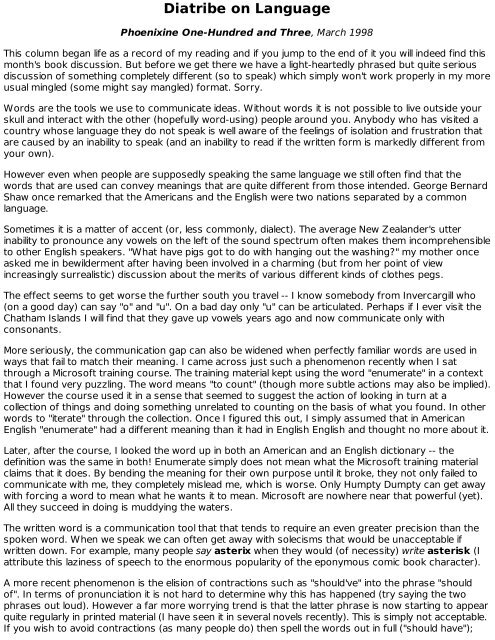Triffids Beard 2 - The Bearded Triffid
Triffids Beard 2 - The Bearded Triffid
Triffids Beard 2 - The Bearded Triffid
Create successful ePaper yourself
Turn your PDF publications into a flip-book with our unique Google optimized e-Paper software.
Diatribe on Language<br />
Phoenixine One-Hundred and Three, March 1998<br />
This column began life as a record of my reading and if you jump to the end of it you will indeed find this<br />
month's book discussion. But before we get there we have a light-heartedly phrased but quite serious<br />
discussion of something completely different (so to speak) which simply won't work properly in my more<br />
usual mingled (some might say mangled) format. Sorry.<br />
Words are the tools we use to communicate ideas. Without words it is not possible to live outside your<br />
skull and interact with the other (hopefully word-using) people around you. Anybody who has visited a<br />
country whose language they do not speak is well aware of the feelings of isolation and frustration that<br />
are caused by an inability to speak (and an inability to read if the written form is markedly different from<br />
your own).<br />
However even when people are supposedly speaking the same language we still often find that the<br />
words that are used can convey meanings that are quite different from those intended. George Bernard<br />
Shaw once remarked that the Americans and the English were two nations separated by a common<br />
language.<br />
Sometimes it is a matter of accent (or, less commonly, dialect). <strong>The</strong> average New Zealander's utter<br />
inability to pronounce any vowels on the left of the sound spectrum often makes them incomprehensible<br />
to other English speakers. "What have pigs got to do with hanging out the washing?" my mother once<br />
asked me in bewilderment after having been involved in a charming (but from her point of view<br />
increasingly surrealistic) discussion about the merits of various different kinds of clothes pegs.<br />
<strong>The</strong> effect seems to get worse the further south you travel -- I know somebody from Invercargill who<br />
(on a good day) can say "o" and "u". On a bad day only "u" can be articulated. Perhaps if I ever visit the<br />
Chatham Islands I will find that they gave up vowels years ago and now communicate only with<br />
consonants.<br />
More seriously, the communication gap can also be widened when perfectly familiar words are used in<br />
ways that fail to match their meaning. I came across just such a phenomenon recently when I sat<br />
through a Microsoft training course. <strong>The</strong> training material kept using the word "enumerate" in a context<br />
that I found very puzzling. <strong>The</strong> word means "to count" (though more subtle actions may also be implied).<br />
However the course used it in a sense that seemed to suggest the action of looking in turn at a<br />
collection of things and doing something unrelated to counting on the basis of what you found. In other<br />
words to "iterate" through the collection. Once I figured this out, I simply assumed that in American<br />
English "enumerate" had a different meaning than it had in English English and thought no more about it.<br />
Later, after the course, I looked the word up in both an American and an English dictionary -- the<br />
definition was the same in both! Enumerate simply does not mean what the Microsoft training material<br />
claims that it does. By bending the meaning for their own purpose until it broke, they not only failed to<br />
communicate with me, they completely mislead me, which is worse. Only Humpty Dumpty can get away<br />
with forcing a word to mean what he wants it to mean. Microsoft are nowhere near that powerful (yet).<br />
All they succeed in doing is muddying the waters.<br />
<strong>The</strong> written word is a communication tool that that tends to require an even greater precision than the<br />
spoken word. When we speak we can often get away with solecisms that would be unacceptable if<br />
written down. For example, many people say asterix when they would (of necessity) write asterisk (I<br />
attribute this laziness of speech to the enormous popularity of the eponymous comic book character).<br />
A more recent phenomenon is the elision of contractions such as "should've" into the phrase "should<br />
of". In terms of pronunciation it is not hard to determine why this has happened (try saying the two<br />
phrases out loud). However a far more worrying trend is that the latter phrase is now starting to appear<br />
quite regularly in printed material (I have seen it in several novels recently). This is simply not acceptable.<br />
If you wish to avoid contractions (as many people do) then spell the words out in full ("should have");


